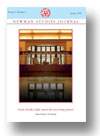|
editorial preface |
|
1.
|
Newman Studies Journal:
Volume >
5 >
Issue: 1
John T. Ford
“Lead, Kindly Light, Amid The Encircling Gloom”
view |
rights & permissions
| cited by
|
|
|
|
|
articles |
|
2.
|
Newman Studies Journal:
Volume >
5 >
Issue: 1
John R. Connolly
Newman’s Notion of the Indwelling of the Holy Spirit in the Parochial and Plain Sermons
abstract |
view |
rights & permissions
| cited by
This essay analyzes Newman’s understanding of the indwelling of the Holy Spirit in his Parochial and Plain Sermons (1825–1843): the nature of the indwelling of the Holy Spirit; the role of the Holy Spirit in regeneration; the appropriation of the indwelling of the Holy Spirit in the Christian through baptism; and the role of the Holy Spirit outside the Church. The final section indicates how some aspects of Newman’s theology of the Holy Spirit are still relevant for the discussion about the Holy Spirit in contemporary Catholic theology.
|
|
|
|
|
3.
|
Newman Studies Journal:
Volume >
5 >
Issue: 1
Kevin Mongrain
John Henry Newman on Ecclesial Spiritual Life
abstract |
view |
rights & permissions
| cited by
This essay is a theological interpretation of John Henry Newman’s 1877 Preface to the third edition of the Via Media of the Anglican Church. Looking at the 1877 Preface through the lens of his earlier Anglican sermons, particularly his Parochial and Plain Sermons, this essay explores Newman’s general pneumatology and its influence on his ecclesiology and considers the spirituality underlying Newman’s Christocentric and Trinitarian vision of the Church as a mutually informing and correcting symbiosis of the spiritual, theological, and hierarchical dimensions of Christian faith.
|
|
|
|
|
4.
|
Newman Studies Journal:
Volume >
5 >
Issue: 1
Ono Ekeh
The Phenomenological Context and Transcendentalism of John Henry Newman and Edmund Husserl
abstract |
view |
rights & permissions
| cited by
John Henry Newman has rightly been hailed as a giant in the Catholic intellectual tradition. His contributions to theology, literature, and education have been studied at length; however, his contribution to philosophy has not received appropriate attention. This essay 1) explores Newman’s unique philosophical insights in terms of the phenomenological tradition of Edmund Husserl; 2) analyzes the transcendental approach of certain British scientists—notably Ronald Knox and Charles Darwin; and 3) discusses how Newman might be considered a phenomenologist.
|
|
|
|
|
sermon studies |
|
5.
|
Newman Studies Journal:
Volume >
5 >
Issue: 1
Thomas Poynor
“How Can These Things Be?”:
Newman’s Anglican Sermon on “The Christian Mysteries”
abstract |
view |
rights & permissions
| cited by
This study considers three aspects of “The Christian Mysteries,” one of Newman’s early Anglican sermons: 1) the use of Scripture in the exposition of the Mysteries of Faith; 2) the definition of Mystery; and 3) the moral effect of Mystery
|
|
|
|
|
6.
|
Newman Studies Journal:
Volume >
5 >
Issue: 1
Donald Graham
Newman’s Sermon on “The Mystery of the Holy Trinity”:
A Response to Richard Whately?
abstract |
view |
rights & permissions
| cited by
After discussing the contents of this sermon—which is structured around the Athanasian Creed and emphasizes the inner life of the Trinity—this study raises the question of whether Newman wrote this sermon as a response to the Trinitarian heterodoxy of his one-time mentor, Richard Whately, Anglican Archbishop of Dublin.
|
|
|
|
|
7.
|
Newman Studies Journal:
Volume >
5 >
Issue: 1
David Delio
A “Multitude Of Subtle Influences”:
Faith, Reason, and Conversion in Newman’s Thirteenth Oxford University Sermon
abstract |
view |
rights & permissions
| cited by
This sermon study begins with reflections about Newman’s frame of mind at the time of his thirteenth University Sermon—“Implicit and Explicit Reason” (1840). For Newman, the time was the beginning of an intellectual and spiritual conversion, while the sermon itself described the powerful interplay of reason and faith in Christian believers and presented the rudiments of an epistemology that would later influencehis An Essay in Aid of a Grammar of Assent (1870).
|
|
|
|
|
book reviews |
|
8.
|
Newman Studies Journal:
Volume >
5 >
Issue: 1
Edward J. Enright
William Bernard Ullathorne:
A Different Kind of Monk
view |
rights & permissions
| cited by
|
|
|
|
|
9.
|
Newman Studies Journal:
Volume >
5 >
Issue: 1
Frances C. Brown
Prophets, Guardians, and Saints:
Shapers of Modern Catholic History
view |
rights & permissions
| cited by
|
|
|
|
|
10.
|
Newman Studies Journal:
Volume >
5 >
Issue: 1
Joel Warden
Edward Caswall:
Newman’s Brother and Friend
view |
rights & permissions
| cited by
|
|
|
|
|
11.
|
Newman Studies Journal:
Volume >
5 >
Issue: 1
John T. Ford
The Great Catholic Reformers:
From Gregory the Great to Dorothy Day
view |
rights & permissions
| cited by
|
|
|
|
|
contents |
|
12.
|
Newman Studies Journal:
Volume >
5 >
Issue: 1
Newman Bibliography and General Resources
view |
rights & permissions
| cited by
|
|
|
|
|
13.
|
Newman Studies Journal:
Volume >
5 >
Issue: 1
Newman Chronology
view |
rights & permissions
| cited by
|
|
|
|
|
14.
|
Newman Studies Journal:
Volume >
5 >
Issue: 1
NINS Update
view |
rights & permissions
| cited by
|
|
|
|
|
15.
|
Newman Studies Journal:
Volume >
5 >
Issue: 1
Announcement
view |
rights & permissions
| cited by
|
|
|
|
